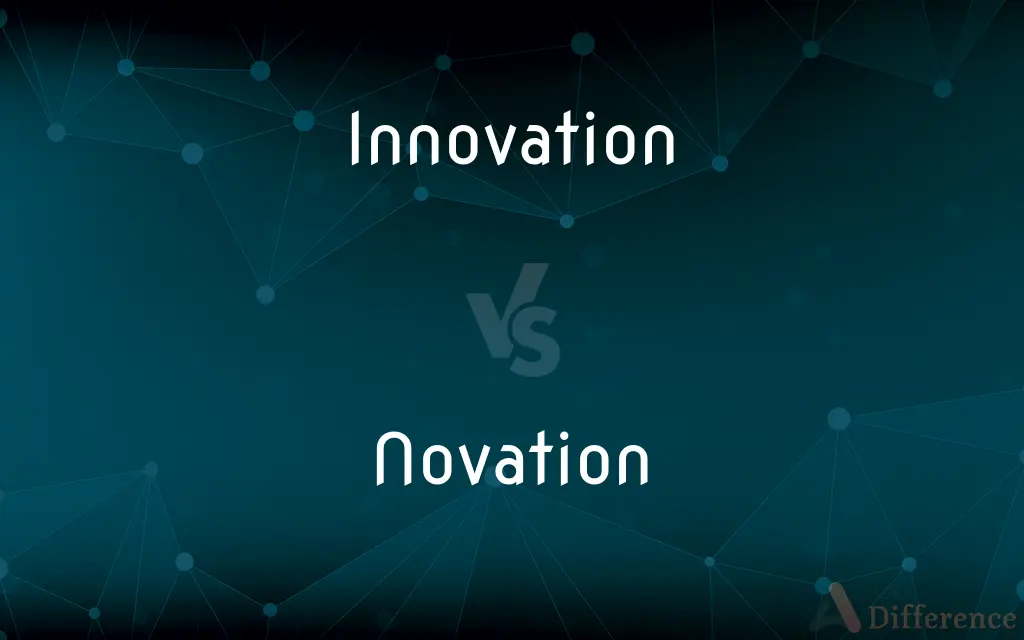Innovation vs. Novation — What's the Difference?
By Urooj Arif & Maham Liaqat — Updated on May 6, 2024
Innovation involves introducing new ideas or methods to improve something, while novation replaces an existing obligation with a new one.

Difference Between Innovation and Novation
Table of Contents
ADVERTISEMENT
Key Differences
Innovation typically refers to the process of introducing something new, such as a product, idea, or method, that aims to improve efficiency, effectiveness, or competitive advantage. On the other hand, novation is a legal concept primarily used in contract law, involving the replacement of an existing obligation with a new one, thereby extinguishing the original contract and starting anew.
In the business context, innovation is crucial for growth and adaptation. Companies innovate to stay relevant and competitive in rapidly changing markets. Whereas novation is used in business to renegotiate contracts, ensuring that they remain beneficial and pertinent as circumstances change.
Innovation can occur in any sector or area of life, from technology to education, and does not necessarily require formal agreements. Conversely, novation specifically requires the agreement of all parties involved in the contract, including the party being replaced.
The outcome of innovation is often uncertain, and it generally involves risk and experimentation. In contrast, novation is used to clarify and reset the terms of an agreement, reducing uncertainty and aligning the interests of all parties.
While innovation is driven by creativity and the desire to achieve something better or more efficient, novation is driven by necessity and legal considerations, often to adapt to new parties or changed contractual environments.
ADVERTISEMENT
Comparison Chart
Definition
Introduction of new ideas or methods.
Replacement of an existing obligation with a new one.
Context
Business, technology, education, etc.
Contract law.
Purpose
Improve efficiency, effectiveness, or impact.
Reset or clarify contractual obligations.
Requirements
Creativity and willingness to take risks.
Agreement of all original and new parties involved.
Outcome Uncertainty
High, involves experimentation.
Low, aims to clarify and formalize terms.
Compare with Definitions
Innovation
A new method, idea, or product.
The company's latest innovation has dramatically reduced energy costs.
Novation
Agreement to substitute a new for an old debt.
The novation agreement cleared the previous liabilities.
Innovation
The act of innovating; introducing new concepts.
Innovation in mobile technology is rapidly evolving.
Novation
Discharge of a contract by mutual agreement.
Novation of their agreement allowed for renegotiations.
Innovation
Implementation of creative ideas to generate value.
Their focus on innovation has improved customer satisfaction.
Novation
A legal mechanism to continue performance under a new party.
Novation was necessary to incorporate the new terms.
Innovation
A new device or process developed by experimentation.
The new battery technology was a groundbreaking innovation.
Novation
Renewal of a legal obligation.
The business conducted a novation to change the service provider.
Innovation
A change that creates a new dimension of performance.
The software innovation revolutionized data management.
Novation
The act of replacing an obligation with a new one.
The contract underwent novation when the new owner took over.
Innovation
Innovation is the practical implementation of ideas that result in the introduction of new goods or services or improvement in offering goods or services. ISO TC 279 on innovation management proposes in the standards, ISO 56000:2020 to define innovation as "a new or changed entity creating or redistributing value".
Novation
Novation, in contract law and business law, is the act of – replacing an obligation to perform with another obligation; or adding an obligation to perform; or replacing a party to an agreement with a new party.In international law, novation is the acquisition of territory by a sovereign state through "the gradual transformation of a right in territorio alieno [in foreign territory] into full sovereignty without any formal and unequivocal instrument to that effect intervening".
Innovation
The action or process of innovating
Innovation is crucial to the continuing success of any organization
Novation
The substitution of a new contract for a previous contract, or the substitution of a new party for a previous party in a contract, so that the previous obligation is considered discharged or the previous obligor released.
Innovation
The act of introducing something new.
Novation
(legal) Replacement of a contract with one or more new contracts, in particular in financial markets the replacement of a contract between a particular buyer and seller with contracts between the clearing house and each party.
Innovation
Something newly introduced.
Novation
(legal) A new contract between the original contracting parties whereby the first obligation is extinguished and a new obligation is substituted.
An example of a novation is where an original debt which was payable in two instalments is novated to become payable in five installments.
Innovation
The act of innovating; the introduction of something new, in customs, rites, etc.
Novation
Innovation.
I shall easily grant that novations in religion are a main cause of distempers in commonwealths.
Innovation
A change effected by innovating; a change in customs
Novation
A substitution of a new debt for an old one; also, the remodeling of an old obligation; debt restructuring.
Innovation
Something new, and contrary to established customs, manners, or rites.
Novation
(law) the replacement of one obligation by another by mutual agreement of both parties; usually the replacement of one of the original parties to a contract with the consent of the remaining party
Innovation
A newly formed shoot, or the annually produced addition to the stems of many mosses.
Innovation
The act of innovating; introduction of something new, in customs, rites, commercial products, etc.
Innovation
A change effected by innovating; a change in customs; something new, and contrary to established customs, manners, or rites.
The love of things ancient doth argue stayedness, but levity and lack of experience maketh apt unto innovations.
Innovation
A newly formed shoot, or the annually produced addition to the stems of many mosses.
Innovation
A creation (a new device or process) resulting from study and experimentation
Innovation
The creation of something in the mind
Innovation
The act of starting something for the first time; introducing something new;
She looked forward to her initiation as an adult
The foundation of a new scientific society
He regards the fork as a modern introduction
Common Curiosities
Is novation common in all types of contracts?
Novation is common in various contracts but is particularly prevalent in industries where long-term projects and multiple parties are involved, such as construction or corporate restructuring.
Can innovation affect an existing contract?
Yes, innovative changes may prompt a review or update of contracts but do not inherently replace them.
How does innovation impact a company’s competitive edge?
Innovation can significantly enhance a company's competitiveness by introducing efficiencies or new products that better meet consumer demands.
What is required for a novation to take place?
All parties involved in the original agreement must consent to the novation, which replaces the existing obligations with new ones.
Can a company be innovative without technological advancements?
Yes, innovation can also occur in processes, services, or business models, not just in technology.
What is the primary difference between innovation and novation?
Innovation refers to the creation and adoption of new ideas or methods, while novation involves legally replacing an old obligation with a new one.
Do innovation and novation require significant investment?
Innovation often requires investment in research and development, whereas novation might incur legal costs but not necessarily significant financial investment.
How does novation affect the parties involved in a contract?
Novation releases one party from obligations and introduces another, potentially altering the balance of responsibilities and rights.
Why might a company choose novation?
Companies opt for novation to adjust to changes in business ownership, operational needs, or to reflect new strategic partnerships.
What are the risks associated with innovation?
Innovation carries risks including failure of the new idea, financial losses, and disruption of current processes.
Share Your Discovery

Previous Comparison
Auntie vs. Aunt
Next Comparison
Caster vs. SaltAuthor Spotlight
Written by
Urooj ArifUrooj is a skilled content writer at Ask Difference, known for her exceptional ability to simplify complex topics into engaging and informative content. With a passion for research and a flair for clear, concise writing, she consistently delivers articles that resonate with our diverse audience.
Co-written by
Maham Liaqat















































